2012中考一轮复习精品课件(含2011中考真题)英语外研版七上Modules6-10(41张ppt)
文档属性
| 名称 | 2012中考一轮复习精品课件(含2011中考真题)英语外研版七上Modules6-10(41张ppt) | 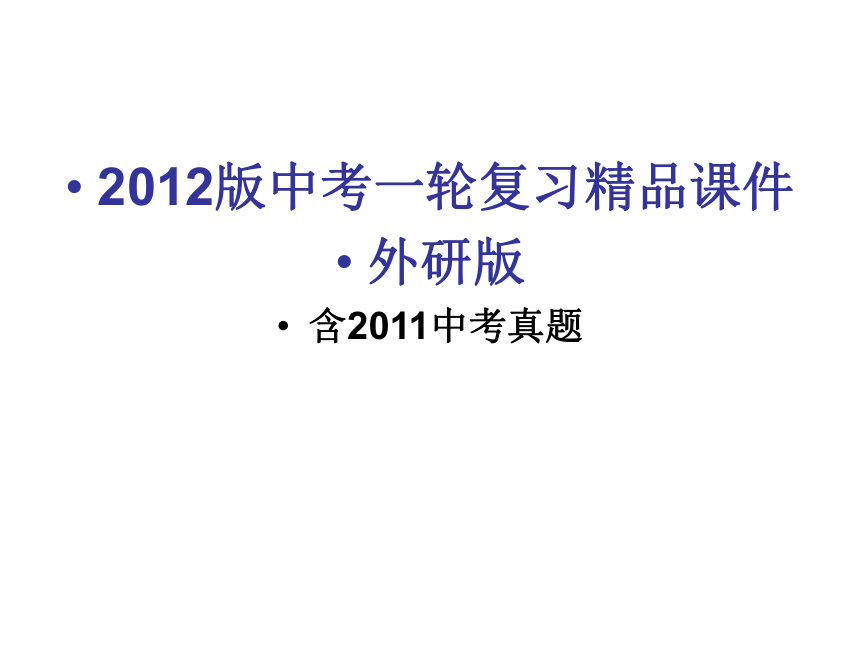 | |
| 格式 | rar | ||
| 文件大小 | 375.7KB | ||
| 资源类型 | 教案 | ||
| 版本资源 | 通用版 | ||
| 科目 | 英语 | ||
| 更新时间 | 2012-01-12 10:41:39 | ||
图片预览

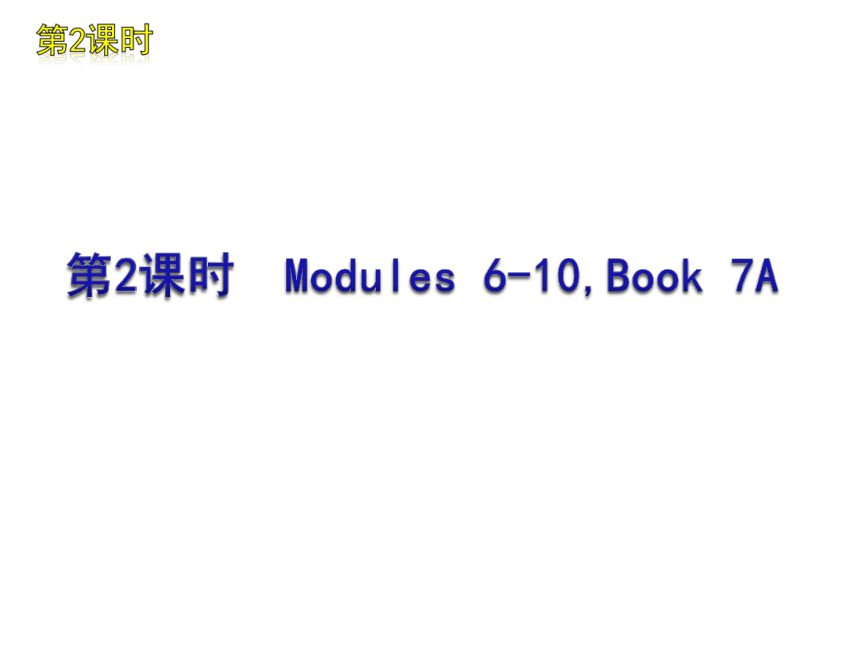
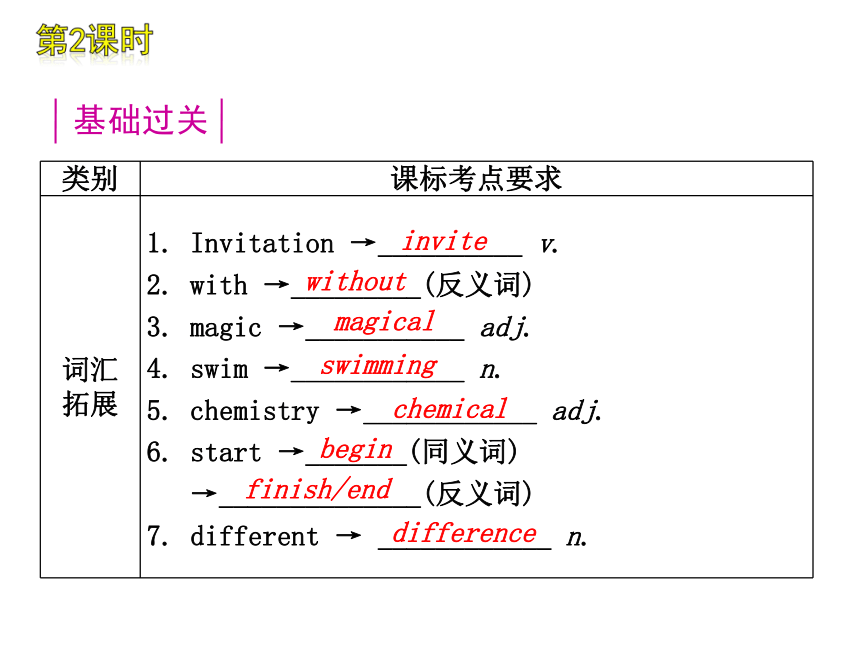
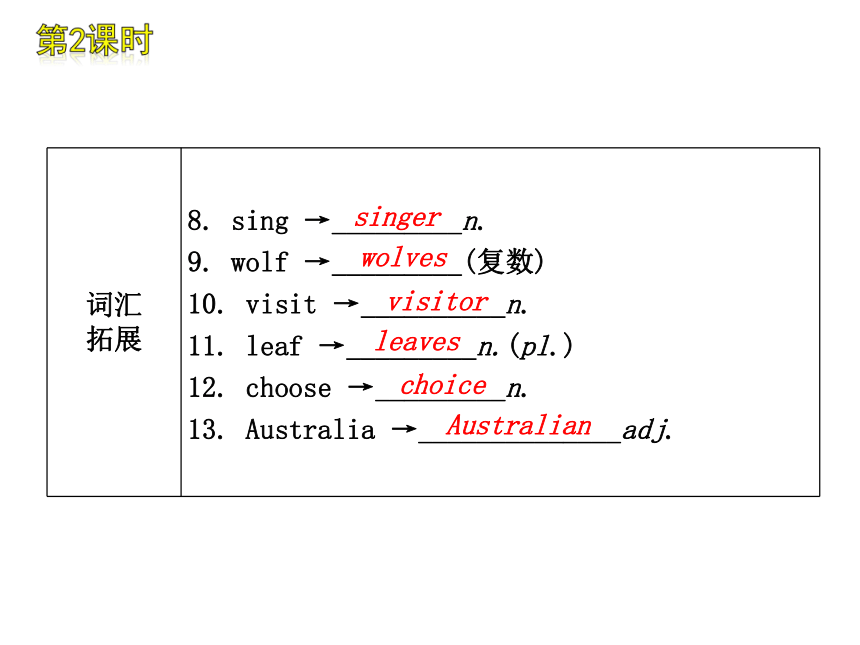
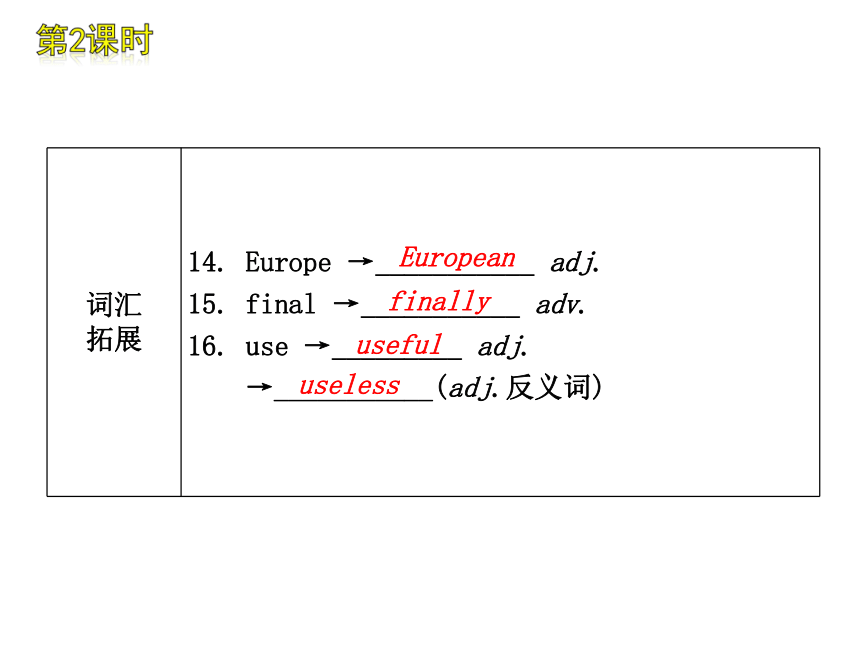
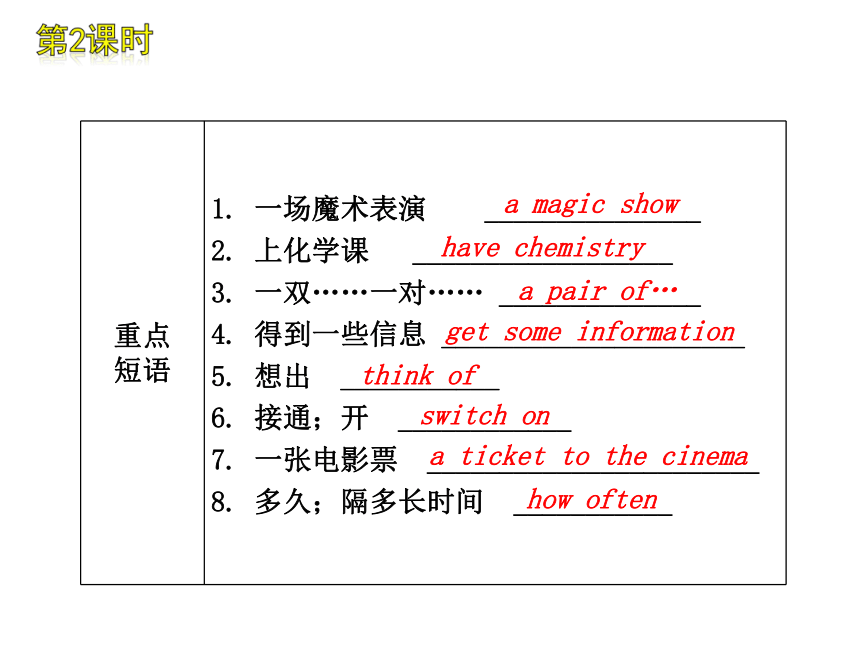
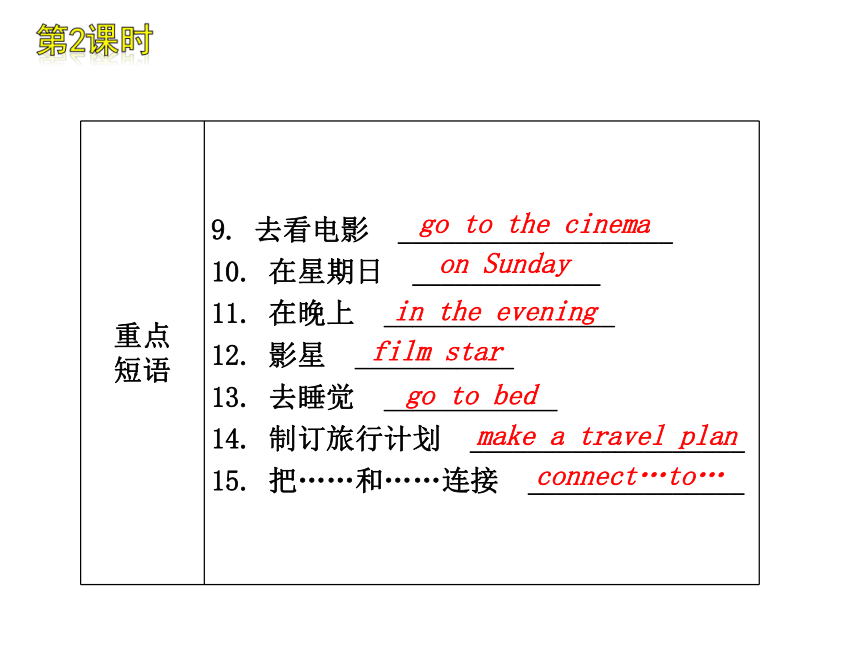
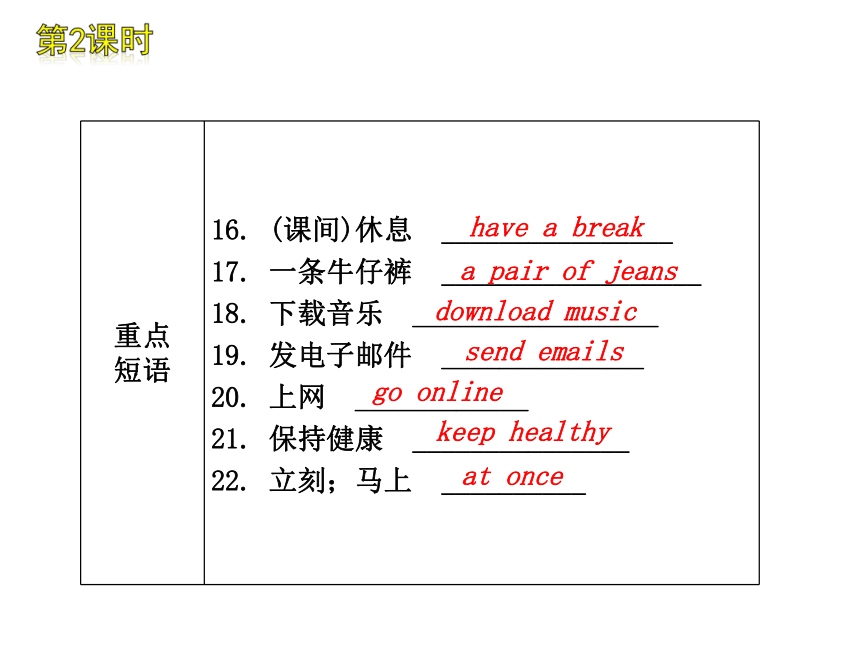
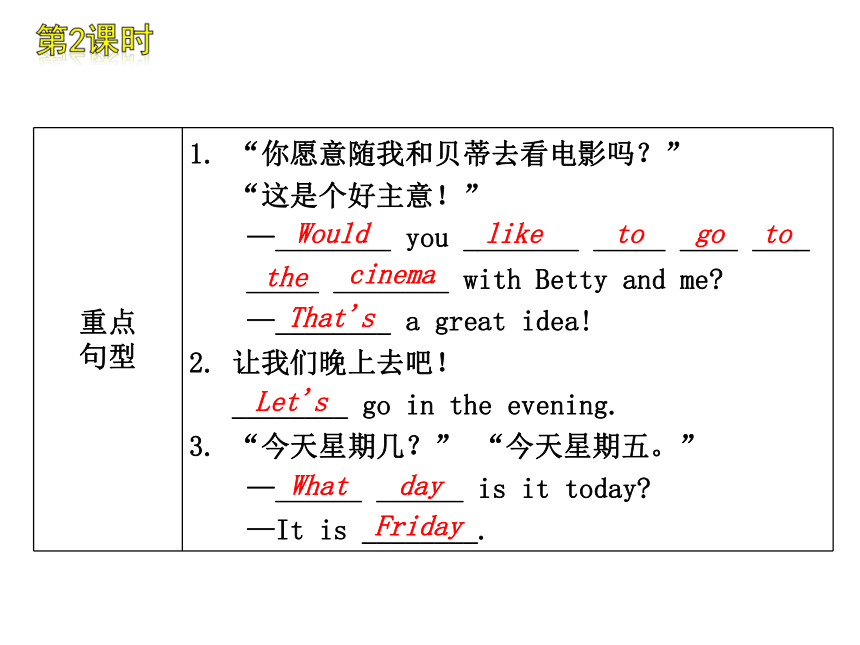
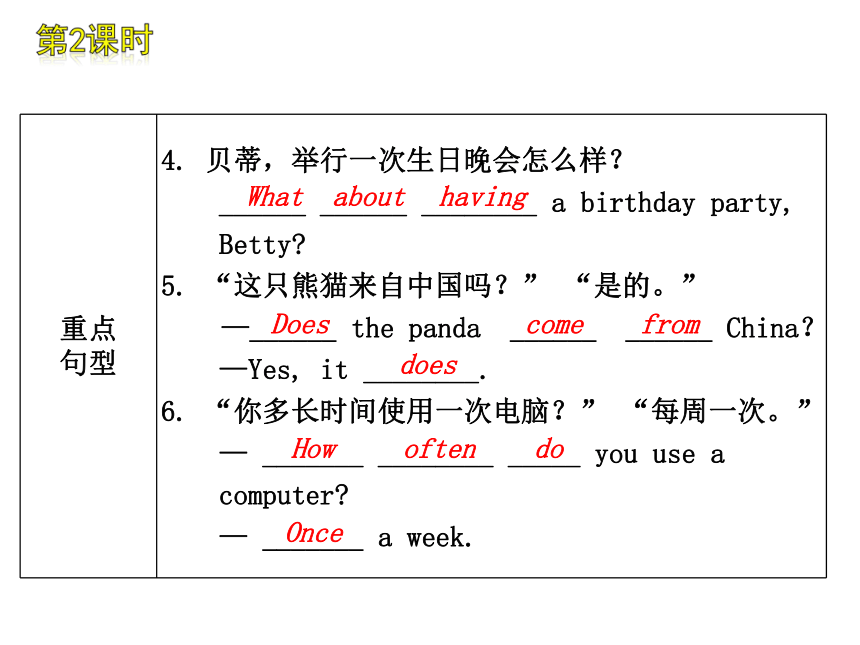
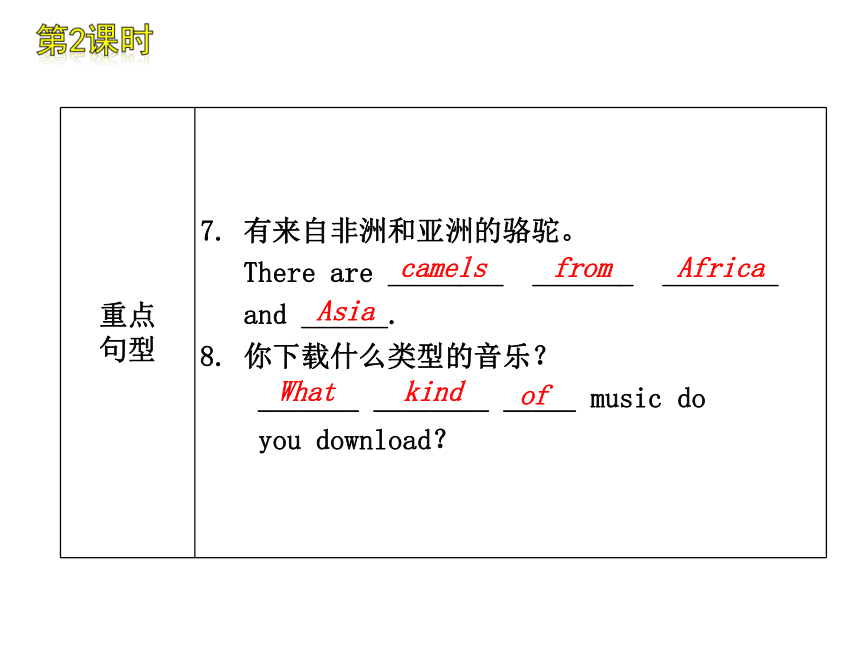
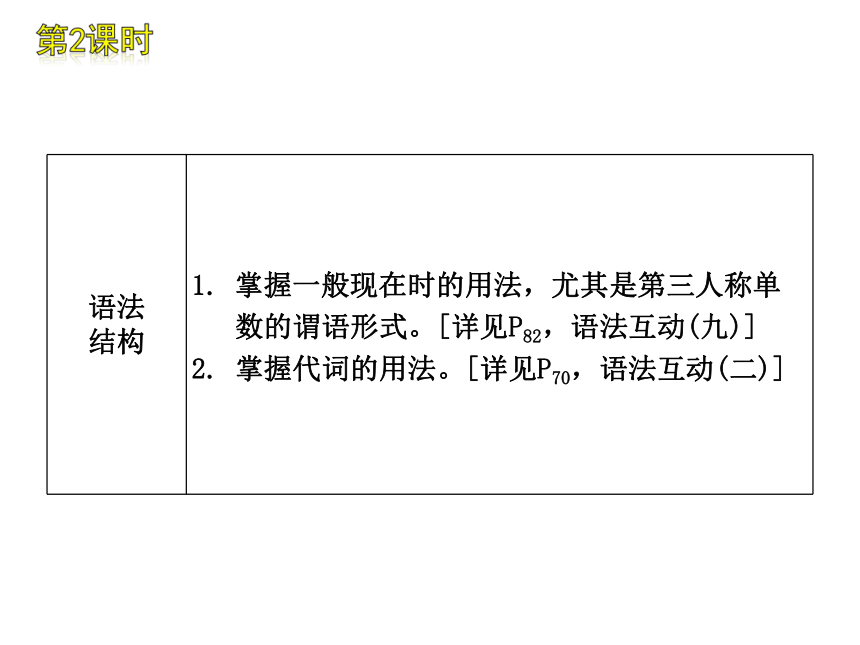
文档简介
(共41张PPT)
2012版中考一轮复习精品课件
外研版
含2011中考真题
·外研版(衔接)
基础过关
·外研版(衔接)
类别 课标考点要求
词汇
拓展 1. Invitation →__________ v.
2. with →_________(反义词)
3. magic →___________ adj.
4. swim →____________ n.
5. chemistry →____________ adj.
6. start →_______(同义词)
→______________(反义词)
7. different → ____________ n.
invite
without
magical
swimming
chemical
begin
finish/end
difference
·外研版(衔接)
词汇
拓展 8. sing →_________n.
9. wolf →_________(复数)
10. visit →__________n.
11. leaf →_________n.(pl.)
12. choose →_________n.
13. Australia →______________adj.
singer
wolves
visitor
leaves
choice
Australian
·外研版(衔接)
词汇
拓展 14. Europe →___________ adj.
15. final →___________ adv.
16. use →_________ adj.
→___________(adj.反义词)
European
finally
useful
useless
·外研版(衔接)
重点
短语 1. 一场魔术表演 _______________
2. 上化学课 __________________
3. 一双……一对…… ______________
4. 得到一些信息 _____________________
5. 想出 ___________
6. 接通;开 ____________
7. 一张电影票 _______________________
8. 多久;隔多长时间 ___________
a magic show
have chemistry
a pair of…
get some information
think of
switch on
a ticket to the cinema
how often
·外研版(衔接)
重点
短语 9. 去看电影 ___________________
10. 在星期日 _____________
11. 在晚上 ________________
12. 影星 ___________
13. 去睡觉 ____________
14. 制订旅行计划 ___________________
15. 把……和……连接 _______________
go to the cinema
on Sunday
in the evening
film star
go to bed
make a travel plan
connect…to…
·外研版(衔接)
重点
短语 16. (课间)休息 ________________
17. 一条牛仔裤 __________________
18. 下载音乐 _________________
19. 发电子邮件 ______________
20. 上网 ____________
21. 保持健康 _______________
22. 立刻;马上 __________
have a break
a pair of jeans
download music
send emails
go online
keep healthy
at once
·外研版(衔接)
重点
句型 1. “你愿意随我和贝蒂去看电影吗?”
“这是个好主意!”
—________ you ________ _____ ____ ____
_____ ________ with Betty and me
—________ a great idea!
2. 让我们晚上去吧!
________ go in the evening.
3. “今天星期几?” “今天星期五。”
—______ ______ is it today
—It is ________.
Would
like
to
go
to
the
cinema
That's
Let's
What
day
Friday
·外研版(衔接)
重点
句型 4. 贝蒂,举行一次生日晚会怎么样?
______ ______ ________ a birthday party,
Betty
5. “这只熊猫来自中国吗?” “是的。”
—______ the panda ______ ______ China?
—Yes, it ________.
6. “你多长时间使用一次电脑?” “每周一次。”
— _______ ________ _____ you use a
computer
— _______ a week.
What
about
having
Does
come
from
does
How
often
do
Once
·外研版(衔接)
重点
句型 7. 有来自非洲和亚洲的骆驼。
There are ________ _______ ________
and ______.
8. 你下载什么类型的音乐?
_______ ________ _____ music do
you download?
camels
from
Africa
Asia
What
kind
of
·外研版(衔接)
语法
结构 掌握一般现在时的用法,尤其是第三人称单
数的谓语形式。[详见P82,语法互动(九)]
2. 掌握代词的用法。[详见P70,语法互动(二)]
·外研版(衔接)
1 invite v.邀请
[搭配] invite sb. to sp. 邀请某人到某地
invite sb. to do sth. 邀请某人去干某事 如:
Daming invites Betty to his birthday party every year. 每年大明都邀请贝蒂参加他的生日派对。
[拓展] 其名词形式为invitation。如:
I have an invitation to the cinema.
我有一个去电影院的邀请。
词汇点睛
重点突破
·外研版(衔接)
活学活用
(1) 公司邀请我父亲在亚洲区为他们工作。
That company __________ my father ____ ______
______ them ____ Asian region.
(2) 如果Cindy不被邀请参加派对,我也不去。
____ Cindy_______ _________ ____ the party, I
________ go, either.
invited
to
work
for
in
If
isn't
invited
to
won't
·外研版(衔接)
2 ask v.询问;要求
[点拨] 常用于句式:ask sb.(not) to do sth. 要求某人(不要)干某事。如:Mary's mother asks her not to go out in the evening. 玛丽的妈妈不让她晚上出去。
[拓展] 有类似用法的动词(词组)还有:invite,tell, teach, would like等。
·外研版(衔接)
活学活用
用括号内所给动词的适当形式填空
The teacher asks the students ________(go) to
the playground.
(2) Please invite Daming and Lingling __________
(come) to our home.
to go
to come
·外研版(衔接)
3 talk vi.谈话;谈论
[搭配] (1) talk to sb. =talk with sb. 和……交谈 如:
I shall talk to your father about your study.
就你的学习问题,我会和你爸爸谈的。
(2) talk about/of sth. 谈论关于…… 如:
We talked about it for 4 hours.
我们就这件事谈了四个小时。
·外研版(衔接)
[辨析] speak, tell, say和talk
(1) speak意为“说话(强调能力);发言;讲(语言)”。为不及物动词时,后跟介词to/with,意思是“与……说话”(相当于talk);意为“讲(语言)”时是及物动词。如:
I can speak Chinese.
我会讲汉语。
(2) tell 意为“告诉;讲(故事)”,是个及物动词,后面应有宾语,可用于tell…about…等短语中,意思是“告诉……关于……”。如:
Nobody told me about it.
没人告诉我这事。
·外研版(衔接)
活学活用
(1) 晚上奶奶经常给我讲故事。
My grandmother often _______ me _________ in
the evening.
(2) 我现在会说一些英语了。
I can ________ _______ __________ now.
(3) 我们经常谈论电影。
We often _______ ________ movies.
(4) 我妈妈经常说她喜欢去看电影。
My mother often ______ she likes ________ to
the movies.
tells
stories
speak
some
English
talk
about
says
going
·外研版(衔接)
4 send v.寄;送
[点拨] (1) send常用于send sb. sth.或send sth. to sb.结构中,意为“寄(送)某物给某人”。如:
I send him my email address.
= I send my email address to him.
我把邮件地址发给他了。
·外研版(衔接)
(2) 类似的结构还有:
write sb. sth. = write sth. to sb.
pass sb. sth. = pass sth. to sb.
give sb. sth. = give sth. to sb.
buy sb. sth. = buy sth. for sb.
make sb. sth. = make sth. for sb.
·外研版(衔接)
活学活用
同义句转换
(1) He writes his girlfriend a letter once a week.
= He ________ a letter ____ his girlfriend
once a week.
(2) Can you pass me the book,please
= Can you _______ the book ____ me,
please
(3) We often make Tony a cake.
= We often ______ a cake _____ Tony.
writes
to
pass
to
make
for
·外研版(衔接)
5 thousand num.千
[点拨] 在英语中,hundred, thousand, million, billion 等词前面有基数词修饰表示确定数目时,hundred, thousand, million, billion 要用单数。 如果表示不确定数目时,则要用复数形式,后接of短语。如:
Lily has one thousand reasons to be sad.
Lily有一千个伤心的理由。
hundreds of people 数百人(不确定数字)
·外研版(衔接)
活学活用
( ) [2010·达州]________ trees have been
planted near here, so the air is very
fresh.
A. Two hundreds B. Hundred of
C. Hundreds of D. Hundreds
C
·外研版(衔接)
6 频度副词辨析
频度副词 词义 频度 英文释义
always 总是 100% all the time
usually 通常 90% generally
often 经常 80% (at) many times
sometimes 有时 50% at times, now and then
hardly 几乎不 10% almost none
never 从不 0% not ever, not at any time
·外研版(衔接)
1. 频率副词在句中的位置是比较灵活的,它们可以置于句首、句中和句尾。在句中的位置最常见的是放在系动词be、助动词或情态动词之后、行为动词之前。如:
Li Hong often goes to see Mr Li.
李红常去看望李老师。
2. 对频度副词的提问常用How often。如:
—How often do you go to the library
你多久去一次图书馆?
—Often./Once a week. 经常去。/每周一次。
·外研版(衔接)
活学活用
( )Now the train service is very good.The
trains are ________ on time.
A. hardly B. always
C. never D. sometimes
B
由现在火车的服务很好, 推知“火车总是很准时。”, 故只有always符合题意。
·外研版(衔接)
句型透视
Would you like to go to the cinema with Betty and
me?你愿意同贝蒂和我一起去看电影吗?
[点拨] Would you like…在此处是向他人发出邀请、提出建议的一种表达方式,相关句型具体用法如下:
(1) Would you like sth. 你想要……吗?肯定回答:Yes, please. 否定回答:No, thanks.
(2) Would you like to do sth.?你愿意做……吗?肯定回答用Yes, I'd love to.(是的,我愿意)否定回答常用No,thanks.(不,多谢)或I'm sorry but I can't…(恐怕我不能……)
·外研版(衔接)
(3) Would you like sb. to do sth. 你愿意某人去
干……吗?如:
—Would you like me to help you
—Yes, I'd love to.
“你愿意让我帮你吗?”
“是的,我愿意。”
·外研版(衔接)
活学活用
( ) (1)Would you like ________ with us to the
meeting
A. go B. to go
C. going D. gone
( ) (2)[2010·东阳] —Would you like me to show
you the way
—________.
A. No way
B. Yes, you would.
C. It's right.
D. That's very kind of you.
B
D
·外研版(衔接)
2 How often do you use a computer
你多久使用一次电脑?
[点拨] how often 用于提问动作发生的频率,答语是频度副词或短语,像never,always,often等。
·外研版(衔接)
[拓展] 常见的与how连用的短语还有:
how soon 多久之后;答语常用“in+一段时间”
how long 多久,多长;提问时间或物体长度
how far 多远;提问距离
how many 多少;提问可数名词数量
how much 多少,多少钱;提问不可数名词的量或物品价格
how old 多大;提问年龄
·外研版(衔接)
活学活用
( ) (1)[2010·潍坊]—________do you have PE
lesson
—Three times a week.
A. How long B. How soon
C. How many D. How often
D
答语为“一周三次”, 可知答案为D。
【2011湖北黄石】
39. — _______ do you go shopping with your mother
— I seldom do that.
A. How often B. How soon
C. How far D. How much
答案: A
【解析】词义辨析。how often 指频率,“多久一次”;how soon 指时间“多久,多快”,常用于将来时; how far 指距离,路程,“多远”;how much指数量“多少”。根据答语应为“多久一次”。
·外研版(衔接)
( ) (2)—________is it from here to the railway
station
—About ten kilometres.
A. How far B. How fast
C. How soon D. How often
A
·外研版(衔接)
高频考点
( ) 1. Life in the countryside is quite ________
that in modern cities.
A. the same B. different from
C. full of D. filled with
B
由句意“农村生活与城市生活有着很大的不同”可知, be different from “与……不同”符合题意。
·外研版(衔接)
( ) 2. —What about ______ hiking this weekend
—Great.I'd like with you.
A. to go; going B. going; going
C. going; to go D. to go; to go
C
本题考查what about doing sth.与would like to do sth., 属固定用法。
·外研版(衔接)
( ) 3. The population of Tianjin is ________ than
that of Shanghai.
A. larger B. less
C. smaller D. fewer
C
首先了解“天津的人口比上海的人口少”这一事实; 再次修饰population的词应是large或small。
·外研版(衔接)
( ) 4. The suitcase looks too heavy for the lady
to carry. Let's go to help her,________?
A. will you B. won't you
C. shall we D. do we
C
以let's 开头的祈使句, 其反意疑问句用 shall we。let us do sth. “让我们做某事”, 即向对方提出请求, 对方并不参与,反意疑问句用will you。
【2011浙江杭州】
20. John had a short walk after lunch, ______
A. did he B. didn’t he
C. had he D. hadn’t he
答案:B
【解析】反意疑问句的用法。本题符合“前肯后否”。而由“had”可以判断本句是一般过去时,因此用助动did来反问。
【2011肇庆】
23. The students in Class Two played basketball against Class One yesterday, ______
A.did they B. didn’t they C. weren’t they
答案:B
【解析】反意疑问句。前肯后否,故A排除。陈述句中的动词为played,故后面的问句要借助助动词did。
2012版中考一轮复习精品课件
外研版
含2011中考真题
·外研版(衔接)
基础过关
·外研版(衔接)
类别 课标考点要求
词汇
拓展 1. Invitation →__________ v.
2. with →_________(反义词)
3. magic →___________ adj.
4. swim →____________ n.
5. chemistry →____________ adj.
6. start →_______(同义词)
→______________(反义词)
7. different → ____________ n.
invite
without
magical
swimming
chemical
begin
finish/end
difference
·外研版(衔接)
词汇
拓展 8. sing →_________n.
9. wolf →_________(复数)
10. visit →__________n.
11. leaf →_________n.(pl.)
12. choose →_________n.
13. Australia →______________adj.
singer
wolves
visitor
leaves
choice
Australian
·外研版(衔接)
词汇
拓展 14. Europe →___________ adj.
15. final →___________ adv.
16. use →_________ adj.
→___________(adj.反义词)
European
finally
useful
useless
·外研版(衔接)
重点
短语 1. 一场魔术表演 _______________
2. 上化学课 __________________
3. 一双……一对…… ______________
4. 得到一些信息 _____________________
5. 想出 ___________
6. 接通;开 ____________
7. 一张电影票 _______________________
8. 多久;隔多长时间 ___________
a magic show
have chemistry
a pair of…
get some information
think of
switch on
a ticket to the cinema
how often
·外研版(衔接)
重点
短语 9. 去看电影 ___________________
10. 在星期日 _____________
11. 在晚上 ________________
12. 影星 ___________
13. 去睡觉 ____________
14. 制订旅行计划 ___________________
15. 把……和……连接 _______________
go to the cinema
on Sunday
in the evening
film star
go to bed
make a travel plan
connect…to…
·外研版(衔接)
重点
短语 16. (课间)休息 ________________
17. 一条牛仔裤 __________________
18. 下载音乐 _________________
19. 发电子邮件 ______________
20. 上网 ____________
21. 保持健康 _______________
22. 立刻;马上 __________
have a break
a pair of jeans
download music
send emails
go online
keep healthy
at once
·外研版(衔接)
重点
句型 1. “你愿意随我和贝蒂去看电影吗?”
“这是个好主意!”
—________ you ________ _____ ____ ____
_____ ________ with Betty and me
—________ a great idea!
2. 让我们晚上去吧!
________ go in the evening.
3. “今天星期几?” “今天星期五。”
—______ ______ is it today
—It is ________.
Would
like
to
go
to
the
cinema
That's
Let's
What
day
Friday
·外研版(衔接)
重点
句型 4. 贝蒂,举行一次生日晚会怎么样?
______ ______ ________ a birthday party,
Betty
5. “这只熊猫来自中国吗?” “是的。”
—______ the panda ______ ______ China?
—Yes, it ________.
6. “你多长时间使用一次电脑?” “每周一次。”
— _______ ________ _____ you use a
computer
— _______ a week.
What
about
having
Does
come
from
does
How
often
do
Once
·外研版(衔接)
重点
句型 7. 有来自非洲和亚洲的骆驼。
There are ________ _______ ________
and ______.
8. 你下载什么类型的音乐?
_______ ________ _____ music do
you download?
camels
from
Africa
Asia
What
kind
of
·外研版(衔接)
语法
结构 掌握一般现在时的用法,尤其是第三人称单
数的谓语形式。[详见P82,语法互动(九)]
2. 掌握代词的用法。[详见P70,语法互动(二)]
·外研版(衔接)
1 invite v.邀请
[搭配] invite sb. to sp. 邀请某人到某地
invite sb. to do sth. 邀请某人去干某事 如:
Daming invites Betty to his birthday party every year. 每年大明都邀请贝蒂参加他的生日派对。
[拓展] 其名词形式为invitation。如:
I have an invitation to the cinema.
我有一个去电影院的邀请。
词汇点睛
重点突破
·外研版(衔接)
活学活用
(1) 公司邀请我父亲在亚洲区为他们工作。
That company __________ my father ____ ______
______ them ____ Asian region.
(2) 如果Cindy不被邀请参加派对,我也不去。
____ Cindy_______ _________ ____ the party, I
________ go, either.
invited
to
work
for
in
If
isn't
invited
to
won't
·外研版(衔接)
2 ask v.询问;要求
[点拨] 常用于句式:ask sb.(not) to do sth. 要求某人(不要)干某事。如:Mary's mother asks her not to go out in the evening. 玛丽的妈妈不让她晚上出去。
[拓展] 有类似用法的动词(词组)还有:invite,tell, teach, would like等。
·外研版(衔接)
活学活用
用括号内所给动词的适当形式填空
The teacher asks the students ________(go) to
the playground.
(2) Please invite Daming and Lingling __________
(come) to our home.
to go
to come
·外研版(衔接)
3 talk vi.谈话;谈论
[搭配] (1) talk to sb. =talk with sb. 和……交谈 如:
I shall talk to your father about your study.
就你的学习问题,我会和你爸爸谈的。
(2) talk about/of sth. 谈论关于…… 如:
We talked about it for 4 hours.
我们就这件事谈了四个小时。
·外研版(衔接)
[辨析] speak, tell, say和talk
(1) speak意为“说话(强调能力);发言;讲(语言)”。为不及物动词时,后跟介词to/with,意思是“与……说话”(相当于talk);意为“讲(语言)”时是及物动词。如:
I can speak Chinese.
我会讲汉语。
(2) tell 意为“告诉;讲(故事)”,是个及物动词,后面应有宾语,可用于tell…about…等短语中,意思是“告诉……关于……”。如:
Nobody told me about it.
没人告诉我这事。
·外研版(衔接)
活学活用
(1) 晚上奶奶经常给我讲故事。
My grandmother often _______ me _________ in
the evening.
(2) 我现在会说一些英语了。
I can ________ _______ __________ now.
(3) 我们经常谈论电影。
We often _______ ________ movies.
(4) 我妈妈经常说她喜欢去看电影。
My mother often ______ she likes ________ to
the movies.
tells
stories
speak
some
English
talk
about
says
going
·外研版(衔接)
4 send v.寄;送
[点拨] (1) send常用于send sb. sth.或send sth. to sb.结构中,意为“寄(送)某物给某人”。如:
I send him my email address.
= I send my email address to him.
我把邮件地址发给他了。
·外研版(衔接)
(2) 类似的结构还有:
write sb. sth. = write sth. to sb.
pass sb. sth. = pass sth. to sb.
give sb. sth. = give sth. to sb.
buy sb. sth. = buy sth. for sb.
make sb. sth. = make sth. for sb.
·外研版(衔接)
活学活用
同义句转换
(1) He writes his girlfriend a letter once a week.
= He ________ a letter ____ his girlfriend
once a week.
(2) Can you pass me the book,please
= Can you _______ the book ____ me,
please
(3) We often make Tony a cake.
= We often ______ a cake _____ Tony.
writes
to
pass
to
make
for
·外研版(衔接)
5 thousand num.千
[点拨] 在英语中,hundred, thousand, million, billion 等词前面有基数词修饰表示确定数目时,hundred, thousand, million, billion 要用单数。 如果表示不确定数目时,则要用复数形式,后接of短语。如:
Lily has one thousand reasons to be sad.
Lily有一千个伤心的理由。
hundreds of people 数百人(不确定数字)
·外研版(衔接)
活学活用
( ) [2010·达州]________ trees have been
planted near here, so the air is very
fresh.
A. Two hundreds B. Hundred of
C. Hundreds of D. Hundreds
C
·外研版(衔接)
6 频度副词辨析
频度副词 词义 频度 英文释义
always 总是 100% all the time
usually 通常 90% generally
often 经常 80% (at) many times
sometimes 有时 50% at times, now and then
hardly 几乎不 10% almost none
never 从不 0% not ever, not at any time
·外研版(衔接)
1. 频率副词在句中的位置是比较灵活的,它们可以置于句首、句中和句尾。在句中的位置最常见的是放在系动词be、助动词或情态动词之后、行为动词之前。如:
Li Hong often goes to see Mr Li.
李红常去看望李老师。
2. 对频度副词的提问常用How often。如:
—How often do you go to the library
你多久去一次图书馆?
—Often./Once a week. 经常去。/每周一次。
·外研版(衔接)
活学活用
( )Now the train service is very good.The
trains are ________ on time.
A. hardly B. always
C. never D. sometimes
B
由现在火车的服务很好, 推知“火车总是很准时。”, 故只有always符合题意。
·外研版(衔接)
句型透视
Would you like to go to the cinema with Betty and
me?你愿意同贝蒂和我一起去看电影吗?
[点拨] Would you like…在此处是向他人发出邀请、提出建议的一种表达方式,相关句型具体用法如下:
(1) Would you like sth. 你想要……吗?肯定回答:Yes, please. 否定回答:No, thanks.
(2) Would you like to do sth.?你愿意做……吗?肯定回答用Yes, I'd love to.(是的,我愿意)否定回答常用No,thanks.(不,多谢)或I'm sorry but I can't…(恐怕我不能……)
·外研版(衔接)
(3) Would you like sb. to do sth. 你愿意某人去
干……吗?如:
—Would you like me to help you
—Yes, I'd love to.
“你愿意让我帮你吗?”
“是的,我愿意。”
·外研版(衔接)
活学活用
( ) (1)Would you like ________ with us to the
meeting
A. go B. to go
C. going D. gone
( ) (2)[2010·东阳] —Would you like me to show
you the way
—________.
A. No way
B. Yes, you would.
C. It's right.
D. That's very kind of you.
B
D
·外研版(衔接)
2 How often do you use a computer
你多久使用一次电脑?
[点拨] how often 用于提问动作发生的频率,答语是频度副词或短语,像never,always,often等。
·外研版(衔接)
[拓展] 常见的与how连用的短语还有:
how soon 多久之后;答语常用“in+一段时间”
how long 多久,多长;提问时间或物体长度
how far 多远;提问距离
how many 多少;提问可数名词数量
how much 多少,多少钱;提问不可数名词的量或物品价格
how old 多大;提问年龄
·外研版(衔接)
活学活用
( ) (1)[2010·潍坊]—________do you have PE
lesson
—Three times a week.
A. How long B. How soon
C. How many D. How often
D
答语为“一周三次”, 可知答案为D。
【2011湖北黄石】
39. — _______ do you go shopping with your mother
— I seldom do that.
A. How often B. How soon
C. How far D. How much
答案: A
【解析】词义辨析。how often 指频率,“多久一次”;how soon 指时间“多久,多快”,常用于将来时; how far 指距离,路程,“多远”;how much指数量“多少”。根据答语应为“多久一次”。
·外研版(衔接)
( ) (2)—________is it from here to the railway
station
—About ten kilometres.
A. How far B. How fast
C. How soon D. How often
A
·外研版(衔接)
高频考点
( ) 1. Life in the countryside is quite ________
that in modern cities.
A. the same B. different from
C. full of D. filled with
B
由句意“农村生活与城市生活有着很大的不同”可知, be different from “与……不同”符合题意。
·外研版(衔接)
( ) 2. —What about ______ hiking this weekend
—Great.I'd like with you.
A. to go; going B. going; going
C. going; to go D. to go; to go
C
本题考查what about doing sth.与would like to do sth., 属固定用法。
·外研版(衔接)
( ) 3. The population of Tianjin is ________ than
that of Shanghai.
A. larger B. less
C. smaller D. fewer
C
首先了解“天津的人口比上海的人口少”这一事实; 再次修饰population的词应是large或small。
·外研版(衔接)
( ) 4. The suitcase looks too heavy for the lady
to carry. Let's go to help her,________?
A. will you B. won't you
C. shall we D. do we
C
以let's 开头的祈使句, 其反意疑问句用 shall we。let us do sth. “让我们做某事”, 即向对方提出请求, 对方并不参与,反意疑问句用will you。
【2011浙江杭州】
20. John had a short walk after lunch, ______
A. did he B. didn’t he
C. had he D. hadn’t he
答案:B
【解析】反意疑问句的用法。本题符合“前肯后否”。而由“had”可以判断本句是一般过去时,因此用助动did来反问。
【2011肇庆】
23. The students in Class Two played basketball against Class One yesterday, ______
A.did they B. didn’t they C. weren’t they
答案:B
【解析】反意疑问句。前肯后否,故A排除。陈述句中的动词为played,故后面的问句要借助助动词did。
